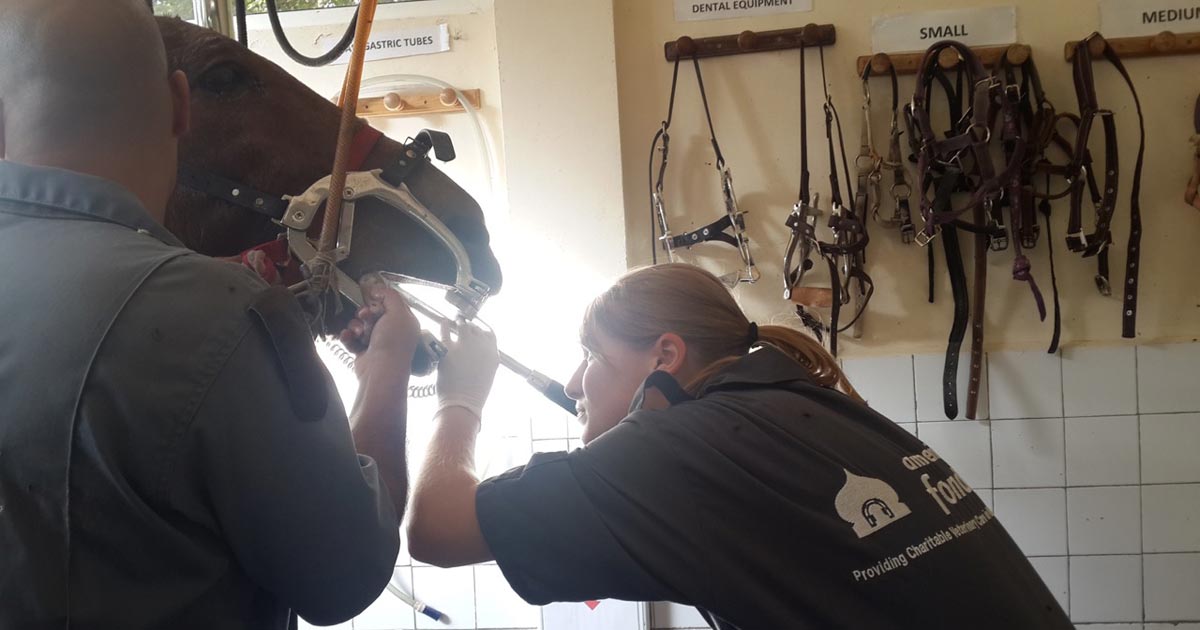Obviously I’m biased, but I think the University of Glasgow offers the best selective rotation options of the vet schools in the UK. Numerous opportunities exist to go abroad, with a variety of options based on species or type of practice.

The traveller in me was never going to pass up an opportunity to take to the skies, so halfway through my final year (eek) I found myself with five classmates on a plane to Morocco.
Language barrier
American Fondouk is a charity clinic for the working equids of Fes. Every morning the gates open at 8am and a stream of mules, donkeys and horses wander in with various ailments.
My French is minimal and Arabic non-existent, so history taking usually involved the owner pointing at the affected body part and translation with the help of a multilingual staff member. Even so, the histories were usually little more than “he fell over” or “it’s been like this for a week”.
Clinical exams were also not without challenges. For a start, it’s important to note donkey “normals” are different to those of horses (at first, we thought everything was hypothermic), and mules kick – in every direction.
Normal’s not normal

Treatment of outpatients could vary from ivermectin and a dental to admission and intensive care for critical cases. It was just a case of dealing with whatever walked through that door.
Certain normal parameters for horses are different in Morocco than in the UK and for a while I couldn’t understand why so much fuss existed about PCVs of 40% – it turns out the Moroccan normal range for PCV is much lower than I was used to.
A full hospital with multiple high-maintenance inpatients certainly kept us on our toes for the month. However, after a couple of weeks, we’d gotten used to a lack of sleep, the protocols for treating certain conditions and the general craziness our daily lives had become.
I felt competent with a number of practical skills I’d never tried before I came to the clinic and could diagnose a tetanus case before it was even off the box. Wound care and bandaging were daily requirements – it was astonishing to see how well some seemingly horrific wounds would heal and the animals recover.
Ethical dilemmas

The hardest thing I found about working at the clinic were the ethics surrounding euthanasia.
To the owners, these animals are often their only source of income – their livelihood – and the economics of replacing a mule are heartbreaking. Emotions run high when a seriously sick mule with a heart rate through the roof, suspected of a surgical colic, desperately in need of the pink juice would leave the owner with nothing.
The other logistical obstacle is the legal status of these animals. In Morocco, these animals are considered property of the owner and as such, permission must be gained before euthanising an animal.
Acting in the interests of the animal without permission is not allowed, so if an owner is not contactable, some unavoidable suffering may occur. This is limited as much as possible through pain relief, despite knowing what ultimately needs to happen in the interests of the animal.
Outside the box
On the whole, we were able to do our best for our patients and provide the optimum care.
I had a great, albeit exhausting, month. Working in a busy environment with somewhat limited resources pushes you to think outside the box and embrace different approaches to problems.
I learned a lot, gained confidence and even managed to discharge a patient in stilted Arabic by the end.

Leave a Reply